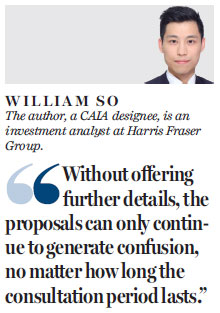The IPO system needs an overhaul, but ongoing public consultation lacks details
Updated: 2016-09-22 07:40
By William So(HK Edition)
|
|||||||||
Three months ago the Securities and Futures Commission (SFC) and Hong Kong Exchanges and Clearing Ltd (HKEX) jointly launched a consultation to collect public views regarding the proposed reforms of the local IPO mechanism. In a nutshell it aims to, as described in the proposal, streamline the IPO listing regulation and application process by strengthening the two-way interaction between the two parties. This is to protect the local market and its reputation from being undermined by any sort of manipulative activities and misconduct in the marketplace.
Unfortunately, since its release, the reform proposal has met fierce opposition from many players in the industry including the Chamber of Hong Kong Listed Companies. This is despite the fact it has won the support of many others including some international asset managers. In the wake of the divergent voices, the two market regulators were forced to extend the consultation deadline by another two months to mid-November.
According to the proposed reform plan, two new committees, namely the Listing Policy Committee and Listing Regulatory Committee, will be set up, with equal representation from the SFC and HKEX. The former will mainly be responsible for initiating and setting listing policies, and the latter will make decisions on IPO applications which may raise suitability concerns or have broader policy implications.

Opponents of the reform argued the equal representation arrangement will allow the local watchdog to intervene in the listing process at an earlier stage, ultimately transforming the current disclosure-based regime to a regulator-based one. To be frank, I couldn't agree more on this. If we adopt such an approach, consequentially a more stringent listing threshold is likely to be set up. This might offer investors better protection but could also kill off the IPO market, as shown by the UK's experience.
For the majority of the IPO applications that do not involve suitability concerns, the existing Listing Department of the HKEX will continue to be the approver. Yet one particular concern I would also like to highlight is that the proposed Listing Policy Committee will be tasked to appraise the work performance of the Listing Department's senior executives. So, does this imply that these senior executives at the HKEX will take all the blame when anything goes wrong?
Having said that, objectively speaking I certainly welcome a change to the existing IPO vetting regime - a reform aimed at enhancing the competitiveness of Hong Kong as an ideal IPO destination for companies and most importantly facilitating an investor-friendly market environment. After all, the current IPO regulatory system was developed many years ago; as the market has been constantly evolving, the regulatory system must also evolve along with it.
Take Alibaba as an example. When it tried to go public in Hong Kong two years ago, it failed to get local regulatory approval as its dual-class structure raised a lot of concern. I am not suggesting that we should or should not allow such dual-class structure, but since some exchanges elsewhere welcome companies with such an arrangement, such as the US and possibly Singapore very soon, then perhaps there is strong reason for Hong Kong to reconsider its stance on such an arrangement. A green light will attract more IPO applicants to Hong Kong.
Yet the 48-page consultation paper lacks any detailed explanations whatsoever. It offers no details on the potential benefits of the proposed reforms; nor does it specify how setting up the two new committees can make the market more efficient, transparent, or fairer; nor does it show us how streamlining the functions could reduce manipulative activities and misconduct of corporate insiders.
At the moment, power sharing is all that market participants can think of the proposed reforms. So without offering further details, the proposals can only continue to generate confusion, no matter how long the consultation period lasts. The public won't have a clear understanding of the proposals and can't provide more objective opinions until the two regulators provide more details regarding the objectives of the reforms.
(HK Edition 09/22/2016 page10)